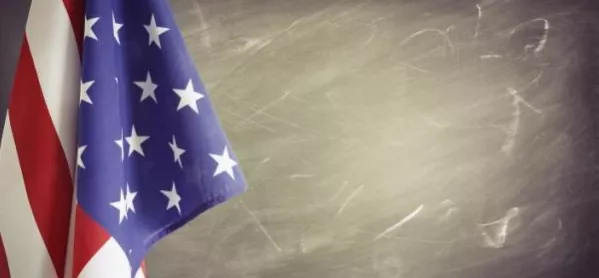When I leave work, my drive home takes me past scores of flimsy yard signs.
They line every main road in the city and, even as someone who cannot vote, I am overwhelmed by the choices on offer.
Trump vs Biden is the race that occupies most of the headlines of course, yet even a short drive across the city makes it abundantly clear the White House is not the only political prize on offer on 3 November.
Exhausted by politics
County commissions, courts and school boards will all be contested in a matter of weeks, and they make up less than half of the races on the ballot.
Although the coronavirus pandemic has redefined my teaching, namely spending more time telling children to unmute than giving them SMART feedback, the political atmosphere still pervades my virtual classroom.
When I moved to North Carolina a few years ago, it seemed like a perfect scenario: a self-professed politics nerd living in the US at a time of fascinating political uncertainty.
Better still, I would even get to do a job I love while watching an election year unfold.
No-one is immune
Only, it’s now 2020, and my election fatigue is becoming almost as powerful as one of the vicious attack ads from the state’s senate race.
Not least because a spend so much time confronting the reality of how the bombastic, cutthroat and relentlessly negative campaign impacts my fourth-grade students.
For example, on 11 September, I presented a video on the terrorist attacks of 2001.
Already feeling somewhat underqualified to teach such a sensitive subject, I was left baffled when one of my students raised his hand to say, “That happened again. I saw it on the TV” he said, seeming to conflate a recent Black Live Matters protest with 9/11 - no doubt having repeatedly seen the attack ads being used in the area.
I struggled for words for a few seconds, but the student continued with confidence: “And it said Cal Cunningham stood by.”
Cal Cunningham, in case you were wondering, is the Democrat challenger to the North Carolinian senate seat that will also be on the ballot in a few weeks’ time.
Meeting their ‘hero’
So contentious and unwavering is the political discourse across the country that this nine-year-old boy had seen an attack ad on the TV, absorbed its message and equated the claims made to the horrific events of 9/11.
Although the intensity of feeling has increased since the election campaigns began, this is not the only moment that has left me hopelessly reaching for the right words.
Last summer, before many of us had even heard the acronym PPE, I was working as a substitute teacher in one of the many year-round schools in the county.
One boy in the third-grade class I was covering could barely contain his excitement as he told me that he had seen the president the night before.
Though I was initially in disbelief, he soon took his phone from his backpack and proudly presented a photo of President Trump at a rally in Greenville, NC.
It was to my horror that I later learned that this was the same rally where the supporters in attendance infamously chanted, “Send her back,” at the mention of Ilhan Omar (the Muslim congresswoman from Minnesota).
Rising above it all - just
Yet through every interaction, every uncomfortable comment, I have to maintain the appearance of indifference.
As a global educator, I was instructed on day one of orientation that I was not to have an opinion.
And I continue to stick to my promise.
Yet floating above the noise as an unattached, opinion less presence does not really solve the challenges of teaching in this political climate.
If there is a right way to teach during one of the most polarising political campaigns in history, I am yet to discover it.
The author is a teacher at a school in the US




